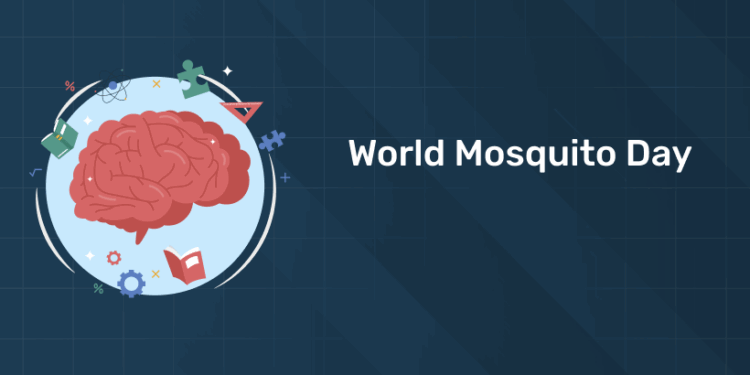Table of Contents
Mosquito name comes from a Spanish word meaning “little fly”. Basically mosquitoes feed on plant nectar, similarly to bees. Generally, we believe that mosquitoes bite humans because they need to feed on human blood, but this is not true. Actually, female mosquitoes suck blood in order to help with the development of their eggs prior to laying them. Male mosquitoes do not feed on blood at all.
Although at times mosquitoes are dangerous because of their ability to carry and transmit diseases. But we can’t deny the fact that mosquitoes also play an important role in the ecosystem because they serve as a food source for many organisms.
Though very small in size, mosquitoes are perhaps the only predator that has thrived through the centuries, causing death through vector-borne diseases. In fact, it is counted among the world’s deadliest, killing more than seven lakh people each year.
To raise awareness and alertness regarding the diseases caused by mosquitoes, world mosquito day was observed on August 20 every year. This day is also a remembrance day for Sir Ronald Ross who discovered a connection between female mosquitoes and malaria. In 1897, Sir Ronald Ross’s discovered that Anopheles mosquitoes transmit the malaria parasite to humans.
World Mosquito Day 2025 Date – August 20
In this article readers can get a glimpse on
- History and Significance of World Mosquito Day
- World Mosquito Day Theme 2025
- World Mosquito Day Quiz
History of World Mosquito Day
1: Who was the first woman President of India?
World Mosquito Day, observed annually on August 20, commemorates a pivotal moment in medical history and serves as a global call to action against mosquito-borne diseases. The day marks the 1897 discovery by British doctor Sir Ronald Ross that female Anopheles mosquitoes transmit malaria to humans.
Before Ross’s groundbreaking research, the cause of malaria was a mystery, often attributed to “bad air” in marshy areas. His work in Secunderabad, India, provided definitive scientific proof of the mosquito’s role as a disease vector. This discovery fundamentally changed the understanding of malaria and laid the groundwork for modern prevention and control strategies. For this monumental achievement, Ross was awarded the Nobel Prize in Physiology or Medicine in 1902.
Ross himself proposed that the day be celebrated to raise public awareness about the connection between mosquitoes and malaria. Since the 1930s, the London School of Hygiene & Tropical Medicine has celebrated World Mosquito Day, and the tradition has since become a globally recognized event.
Today, World Mosquito Day is a platform used by organizations and individuals worldwide to:
- Educate the public about the risks posed by mosquito-borne illnesses, including malaria, dengue, Zika, chikungunya, and yellow fever.
- Highlight the ongoing efforts to combat these diseases through scientific research, vector control programs, and public health initiatives.
- Encourage people to take personal precautions and community-level actions to reduce mosquito populations.
- Acknowledge the contributions of scientists, healthcare professionals, and communities in the ongoing fight against these diseases.
The observance of World Mosquito Day is a powerful reminder that while significant progress has been made, mosquitoes remain one of the deadliest animals on the planet. Continued investment and effort are crucial to finally eradicating these illnesses.
Free UPSKILLING Courses!
Take your first step toward mastering in-demand skills, acing interviews, and securing top-tier jobs with Entri's free upskilling courses.
Start Learning!World Mosquito Day Theme 2025
The theme for World Mosquito Day 2025 is “Accelerating the Fight Against Malaria for a More Equitable World.”
This theme underscores the importance of a rapid and fair approach to combating malaria. It focuses on ensuring that all communities, particularly those most at risk and with limited resources, have equal access to essential tools for prevention, diagnosis, and treatment. This includes scaling up existing interventions such as insecticide-treated bed nets, effective diagnostic tests, and indoor residual spraying, while also ensuring that new advancements and vaccines are available to everyone who needs them. The theme serves as a call for continued innovation in developing more effective mosquito control methods, improving vaccines, and raising public awareness to reduce the overall impact of diseases transmitted by mosquitoes.
World Mosquito Day Previous Themes
World Mosquito Day is observed annually on August 20 to commemorate British doctor Sir Ronald Ross’s 1897 discovery that female anopheles mosquitoes transmit malaria between humans. The day aims to raise global awareness about the dangers of mosquito-borne diseases and the ongoing efforts to combat them.
Here are the themes and primary focuses from recent years:
- 2015: General focus on the importance of combating mosquito-borne diseases.
- 2016: “End Malaria for good.” (This theme was shared with World Malaria Day but was a key message for World Mosquito Day as well).
- 2017: Emphasis on the need to eliminate malaria and other mosquito-borne diseases.
- 2018: “Ready to beat malaria.”
- 2019: “Zero malaria starts with me.”
- 2020: “Hepatitis Free Future.” (This is an error in the search result. The focus for 2020 was on “Malaria” and “vector control,” given the context of the COVID-19 pandemic).
- 2021: “Reaching the Zero Malaria Target.”
- 2022: “Harness innovation to reduce the malaria disease burden and save lives.”
- 2023: “Time to deliver zero malaria: invest, innovate, implement.”
- 2024: “Accelerating the fight against malaria for a more equitable world.”
World Mosquito Day 2025 – Significance
This special day is also observed to highlight and focus on the efforts of healthcare officials, NGOs, and others who are related to the field in fighting against the illness caused by malaria. Mostly, awareness is created in people around diseases caused by mosquitoes.
Apart from people dying of malaria, there are nearly 219 million people who are affected by the same worldwide each year, as per recent statistics. Also, malaria is present in more than 100 countries, they mostly affect tropical locations and areas around the world.
Among the many nations,India has become a favourable breeding place for many mosquito species making it the hotspot for diseases like dengue, yellow fever, malaria, and others.
Free UPSKILLING Courses!
Take your first step toward mastering in-demand skills, acing interviews, and securing top-tier jobs with Entri's free upskilling courses.
Start Learning!World Mosquito Day 2025 – Facts
- The day is observed every year on the August 20th , to commemorate the discovery of the female Anopheles mosquito as the notorious vector for the transmission of Malaria, through the Plasmodium parasite, by the British Scientist Sir Ronald Ross.
- The day is celebrated every year at the Mosquito Center in ‘London School of Hygiene and Tropical Medicine’, amidst wide fanfare of students, researchers and young scientists in honour of the pioneer scientist who discovered the fact.
- Mosquitoes are of different specie and the dreaded ones are the Anopheles ,Aede Aegyptiand Culex variants and they are regarded as creatures of International menace.
- Only female mosquitoes depend on blood for survival. Male mosquitoes feed on the nectar of flowers or other suitable sugar sources.
- The sharp proboscis that mosquitoes use to draw blood has inspired the design of improved, less painful hypodermic needles used in medicine.
- Unlike most bugs, mosquitoes aren’t attracted to light, but to carbon dioxide. This gives them the indication that a mammal with tasty blood is nearby.
- Male and female mosquitoes synchronize their wingbeats with their mates.
- Mosquitoes cause more deaths than any other animal on earth.
World Mosquito Day Quiz 2025
When is World Mosquito Day observed?
A) August 10
B) August 15
C) August 20
A) Louis Pasteur
B) Ronald Ross
C) Robert Koch
3. In which year did Ronald Ross make this discovery?
A) 1897
B) 1905
C) 1915
A) Culex
B) Anopheles
C) Aedes
5. Which mosquito species spreads dengue, chikungunya, and Zika?
A) Anopheles
B) Aedes aegypti
C) Mansonia
A) Africa
B) Asia
C) South America
A) Male
B) Female
C) Both
A) Blood
B) Nectar
C) Sweat
A) 200,000
B) 400,000
C) Over 700,000
Want More Engaging Questions?
Download our FREE PDF packed with insightful quiz questions to test your knowledge!
🔽 Click below to get your free copy now! 🔽
World Mosquito Day Quiz 2025 PDF
World Mosquito Day is not just a remembrance of Ronald Ross’s discovery but also a reminder of the ongoing battle against mosquito-borne diseases. These tiny insects continue to threaten millions of lives each year, particularly in tropical and subtropical regions. With malaria, dengue, Zika, and yellow fever still affecting vulnerable populations, the fight against mosquitoes remains one of global importance. Scientific research, healthcare access, and preventive measures are all critical in reducing the spread of these deadly diseases.
At the same time, individual and community actions play an equally vital role in mosquito control. Simple steps such as using nets, repellents, and eliminating stagnant water can save countless lives. World Mosquito Day emphasizes the need for collective responsibility in creating safer, healthier environments. By remembering the past and acting today, we can work towards a future where mosquito-borne diseases are no longer a threat.
Free UPSKILLING Courses!
Take your first step toward mastering in-demand skills, acing interviews, and securing top-tier jobs with Entri's free upskilling courses.
Start Learning!Frequently Asked Questions
What is the significance of World Mosquito Day?
World Mosquito Day is observed on August 20 each year. It marks the discovery by Sir Ronald Ross in 1897 that mosquitoes transmit malaria. This breakthrough led to major advancements in disease prevention and control. The day highlights the global fight against mosquito-borne diseases. It also spreads awareness about preventive measures and research efforts.
Who was Ronald Ross and what was his contribution?
Ronald Ross was a British doctor and Nobel Prize laureate. In 1897, he proved that Anopheles mosquitoes transmit malaria parasites. This discovery changed the understanding of disease transmission. It paved the way for modern malaria prevention strategies. His work continues to save millions of lives worldwide.
Why are mosquitoes considered the deadliest animals on Earth?
Mosquitoes spread multiple dangerous diseases like malaria, dengue, Zika, and yellow fever. These diseases collectively cause more than 700,000 deaths every year. Their wide distribution makes them a global health threat. Unlike predators, mosquitoes kill indirectly through pathogens. This makes them more dangerous than any wild animal.
Which diseases are transmitted by mosquitoes?
Mosquitoes transmit malaria, dengue fever, chikungunya, yellow fever, Zika virus, and West Nile virus. Anopheles mosquitoes are responsible for malaria. Aedes aegypti mainly spreads dengue, chikungunya, and Zika. Culex mosquitoes transmit diseases like Japanese encephalitis and West Nile fever. Each species spreads different harmful pathogens.
Why do only female mosquitoes bite humans?
Female mosquitoes bite because they need blood for egg development. The proteins and iron from human blood help their eggs grow. Male mosquitoes do not bite and survive on nectar. Females also feed on nectar but require blood as an additional source. This is why they are the main disease carriers.
How can mosquito-borne diseases be prevented?
Prevention methods include using insecticide-treated nets, mosquito repellents, and indoor spraying. Eliminating stagnant water helps stop mosquito breeding. Wearing long clothing can reduce exposure to bites. Vaccines exist for some diseases like yellow fever. Community action is essential for effective mosquito control.
Why is malaria still a major concern worldwide?
Malaria remains one of the leading causes of death in many countries. It especially affects children and pregnant women in sub-Saharan Africa. Limited access to healthcare and preventive tools worsens the issue. Drug resistance in parasites and mosquitoes adds challenges. Despite progress, malaria continues to be a global health burden.
What role does the World Health Organization play in mosquito control?
The World Health Organization (WHO) leads global initiatives against mosquito-borne diseases. It develops strategies for prevention, treatment, and research. WHO also supports countries with funding and technical expertise. Programs like “Roll Back Malaria” aim to reduce cases worldwide. Their efforts are crucial in coordinating global health responses.
How can communities contribute to reducing mosquito threats?
Communities play an important role by eliminating breeding grounds. Regular cleaning of water containers prevents mosquito larvae growth. Using nets and repellents helps reduce bites. Awareness campaigns encourage collective responsibility. Together, communities can significantly reduce mosquito populations.
Why is World Mosquito Day important today?
World Mosquito Day raises awareness about ongoing health risks. Despite progress, mosquito-borne diseases remain deadly. The day reminds us of the importance of scientific research. It also educates people on prevention methods to protect families. Celebrating this day strengthens the global fight against mosquito threats.












